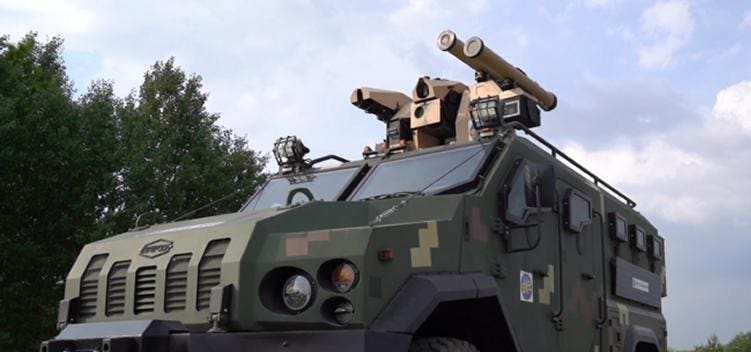The appearance of badly-integrated, improvised fighting vehicles on the Russian side of the front line in Ukraine—including 70-year-old MT-LB armored tractors packing 80-year-old, unstabilized 2M-3 naval turrets—belies an important truth.
Do-it-yourself armored vehicles don’t have to be embarrassing and bad. Case in point: a Ukrainian MT-LB variant featuring a very modern—and very effective—Serdar remote weapons station. Serdar-equipped MT-LBs have been rolling around Ukraine for at least a year now.
The Serdar, a joint product of the Turkish firm Aselsan and Ukraine’s Luch Design Bureau, combines a pair of machine guns, a dual launcher for 200-pound Stugna-P anti-tank missiles, a laser rangefinder and day-night optics, all integrated on a stabilized turret.
An operator aims a Serdar from a flatscreen workstation inside the vehicle. The Stugna-P missile can punch through 800 millimeters of steel at a range of three miles, according to Luch—implying the optics are accurate out to at least that distance.
The two-axis, gyro stabilization is what might matter most. When Russian marines began bolting old 2M-3 turrets with over-under 25-millimeter cannons onto their MT-LBs, they neglected to add much, or any, stabilization.
“There is some feeling that the hydraulics of the 2M-3 were abandoned and switched to fully manual guidance, since this is the simplest solution that does not require labor—but predictably affects the effectiveness of firing,” Edward Perov, a close observer of Russian combat vehicles in Ukraine, noted on his blog.
While some of the better-built MT-LB-2M-3s seem to be able to fire accurately, others shake so violently with each round that they probably are impossible to aim. A badly vibrating MT-LB-2M-3 might be able to frighten Ukrainian troops, but it probably can’t actually hurt them.
The same can’t be said of the Serdar, which was a quick success on its debut around five years ago. The Qatari and Moroccan armed forces have installed the turret on armored trucks.
That Ukraine jointly produces the Serdar made it an easy choice for Ukrainian technicians who scrambled to produce DIY fighting vehicles in the months following Russia’s wider attack on Ukraine starting in February 2022. They installed a Serdar on at least one donated M-113 armored personnel carrier, but the locally-made MT-LB seemed to be the platform of choice for the stabilized turret.
Ukrainian MT-LB-Serdars saw action during Ukraine’s fall 2022 counteroffensive in Kharkiv Oblast in northeastern Ukraine. But sightings of the vehicle type dropped off after January … around the same time observers spotted a wider variety of cruder turrets on Ukrainian MT-LBs.
It’s possible Luch has worked through its stockpile of Serdars and now must either build fresh copies—or pivot to a new turret.
There are signs the firm will pivot, perhaps to a less boutique—and thus less expensive—RWS. In late July, Luch announced it would partner with Turkish company Best Grup to produce a stabilized turret with just a single machine gun and a pair of 80-pound Korsar anti-tank missiles that lack the range and power of the heavier Skif missile.
Read the full article here





